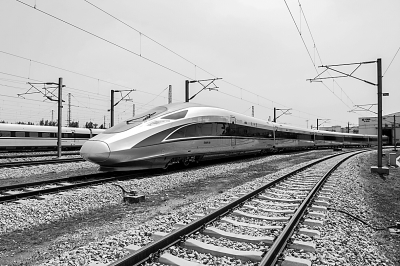Innovation to strengthen national manufacturing

The Fuxing bullet train between Beijing and Shanghai achieved speeds of 350 kilometers per hour, shortening travel time to about four and a half hours.
The breakneck development of manufacturing has made China into the world’s factory. However, the sector has long suffered from low quality standards and a lack of advanced technology.
The nation’s labor distribution and development path are undergoing a transformation while shifting comparative advantages accelerate the reshuffling of the global manufacturing pattern. It is crucial to grasp the opportunities brought by the new era. It was against this backdrop that China’s leaders put forth the “Made in China 2025” strategy to transform the nation from a large manufacturer into a strong one.
The strategy lists 10 sectors that will be the focus of reform, including such high-tech fields as information technology, new materials, advanced machine tools and robots. Clearly, strong scientific and technological innovation is the prerequisite for the development of the manufacturing industry. Innovation is also a key element to improve competitiveness. The future of manufacturing requires innovation to be the driving force. Systems of research and development must be optimized to improve product quality.
An innovation-centered development path raises requirements for training advanced technical talent. The competition for talent is at the root of all forms of competition. However, a structural surplus and a shortage of manufacturing talent exist at the same time in China. Also, there is a paucity of talent in the fields of advanced technology. To address this, the educational system should be optimized and a mechanism to introduce and train talent should be perfected, which will facilitate the ability to innovate and lend support to building strong manufacturing enterprises.
At the same time, an advanced industrial culture and spirit of craftsmanship is indispensable for developing innovation. This serves as the basis for implementing the “Made in China 2025” strategy. The development of industrial culture helps to cultivate positive values and inspire public enthusiasm for innovation.
Presently, China is at a crucial stage in its journey toward becoming a manufacturing power, and global competition is increasingly fierce. To thoroughly implement the strategy, China needs to start a new round of technological upgrading and encourage traditional industries to improve quality and efficiency, thus advancing the goal of becoming a strong manufacturer.
The article was abridged and translated from Guangming Daily.
